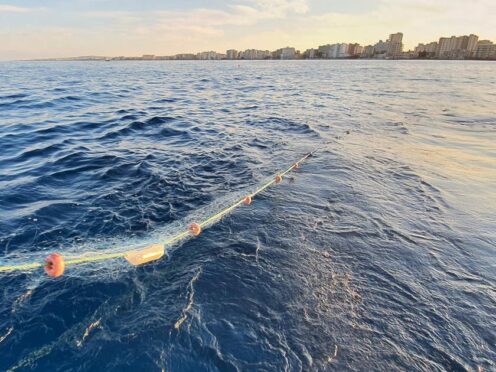
Lighting up fishing nets with green flashing lights could reduce the number of sea turtles which are accidentally caught and killed, a study has found.
An estimated 40,000 turtles die each year in the Mediterranean when they are trapped as “bycatch” in nets targeting fish species.
This includes around 13,800 killed in small-scale fishing operations – which use nets set close to the coast where they trap turtles foraging or near to nesting sites – and scientists warned this figure is likely to be an underestimate.
Skate and ray species, a third of which globally are threatened with extinction, are also commonly caught as bycatch in the Mediterranean.

A trial to attach cheap flashing LED “NetLights” on set nets used by small scale fishers in the Mediterranean suggests it reduced the number of green and loggerhead turtles caught by 42%.
The project by the University of Exeter, the Society for the Protection of Turtles (SPOT) and Cypriot fishermen also halved bycatch of skate and rays.
There was a 53% reduction in accidental catches of rays in nets using the lights, the study published in the journal Fisheries Research showed.
The kit developed by Devon-based conservation engineers Fishtek Marine is made up of a small, long-lasting banana-shaped light powered by two AA batteries, which is attached to fishing ropes to warn off turtles.
Study author Robin Snape, a researcher at Bluedot Associates, and formerly of the University of Exeter, said: “Around Cyprus, over 2,800 sea turtles die in nets every year.
“Our trials with local fishermen and NetLight have shown that this can be significantly reduced.
“Our work has also revealed that NetLights can reduce the bycatch of other threatened species, especially rays, whose numbers fell by 53% when the lights were used.
“This device has real potential in marine conservation.”
The study found there was more bycatch during the day, whether or not NetLights were installed, but overall the lights reduced the accidental catch.
Importantly, they did not deter target species of fish.
And they did not increase the number of lionfish or pufferfish caught in the nets, both of which are invasive species and can harm fishing equipment and the fishermen themselves.
The study involved data from 130 experimental sets, with the researchers warning the reductions in bycatch were only “weakly driven” by NetLights, so more trials involving a greater number of fishing expeditions should be carried out.
Dr Snape said the lights cost about £5, around five times cheaper than similar lights used elsewhere to deter turtles from fishing nets.

And he said the fishermen could incorporate the plastic cups that hold the lights into the nets when they produced them, and then slip the lights out just once a year to change the batteries.
“It’s a step-change in terms of the development of lights, it’s probably the world’s best example of lights, and if they can make it a little bit better in terms of handling time, it makes it a lot more feasible to get (the fishermen) to use it,” he said.
Pete Kibel, co-founder and director of Fishtek Marine, said: “These trials have been very encouraging and show that NetLight has an important role in helping protect sea turtles.
“This is also good news for the local fishermen in Cyprus, as bycatch of turtles can damage their nets and reduce their ability to make a living from fishing.”

Enjoy the convenience of having The Sunday Post delivered as a digital ePaper straight to your smartphone, tablet or computer.
Subscribe for only £5.49 a month and enjoy all the benefits of the printed paper as a digital replica.
Subscribe